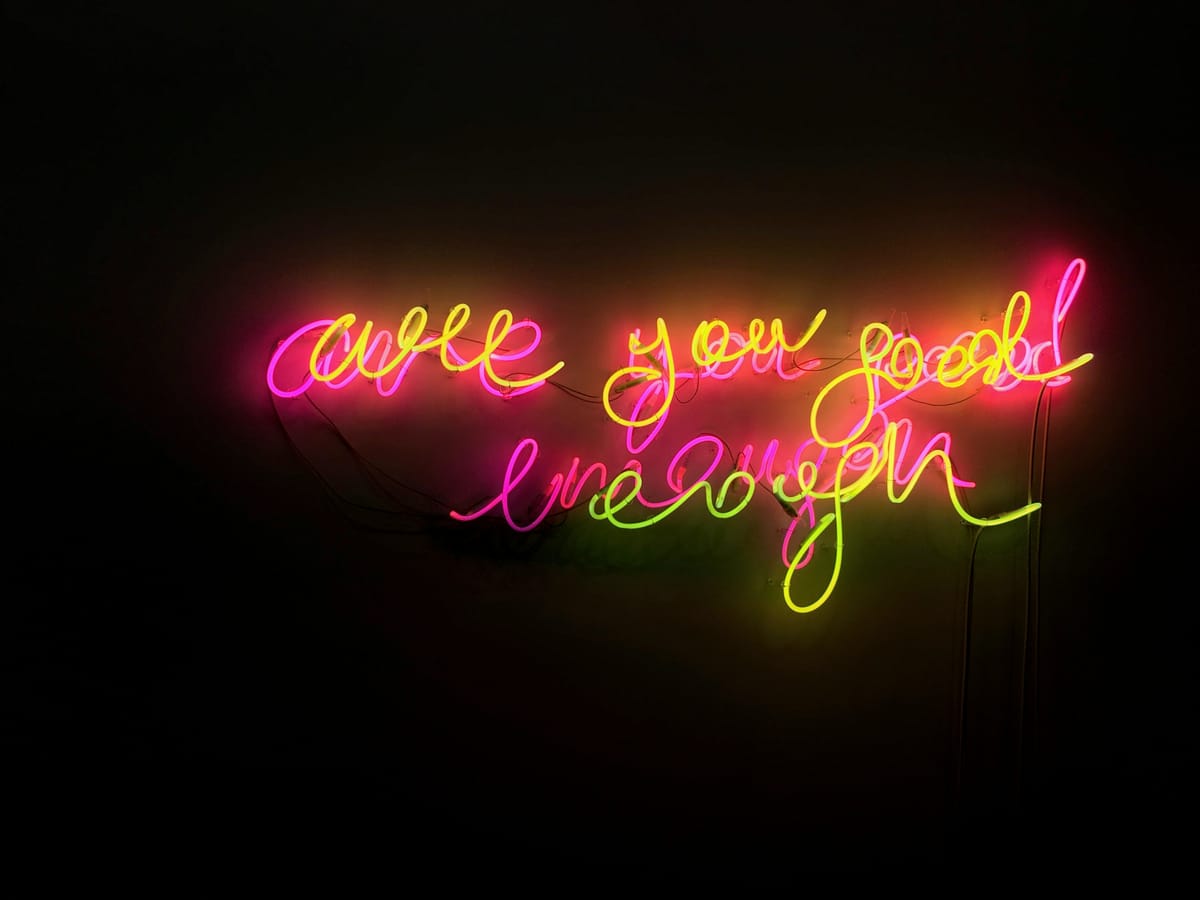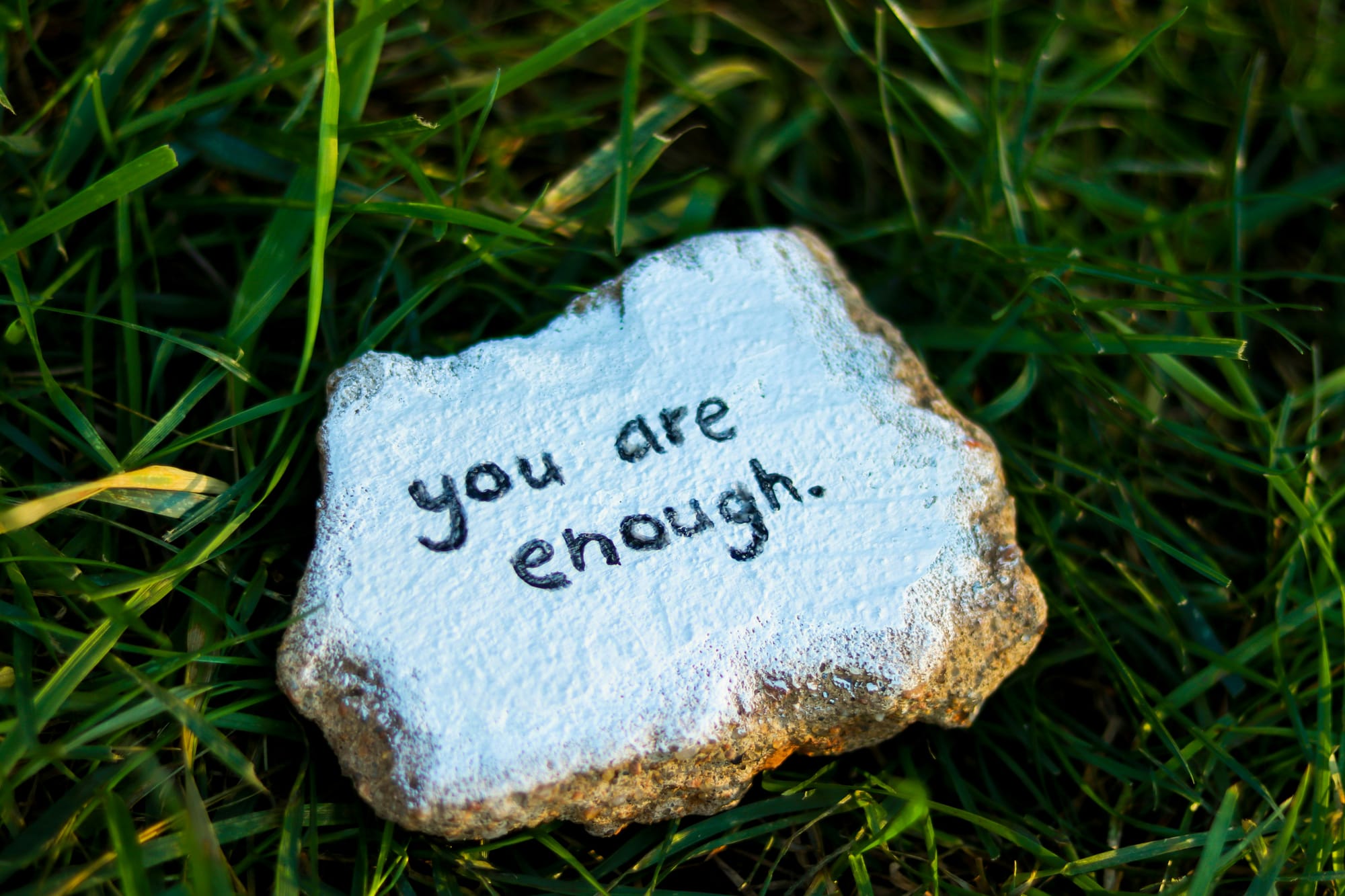When Is It Enough?
Learn some ways to shift how you think about what it means to be enough, and to feel like you are enough.

Do you ever feel like no matter how much you work, or what you do, it never feels like it’s enough?
Does it feel like you're somehow defective in your ability to be organized and productive, and if you could just be more… maybe things wouldn’t feel so chaotic all the time?
If you could find the right system and get organized, perhaps then you would feel in control of your life, and everything would be better. Then it would feel like it’s enough.
Do you look around yourself and assume there has to be a better way to do things than what you’re doing?
There is! But not in the way you think.
While not everyone is naturally organized, and some people struggle with structure, most people are more organized than they think. And truthfully, the issue usually isn’t about being organized or not being organized. It’s more often that you are trying to do too many things, with too many inputs, too many outputs, and likely have wildly unrealistic expectations about what’s even possible each day and week.
Yes, there are processes you can adopt that will make things easier. Yes, there are things you can do to be more efficient. Yes, they are software solutions and mental models that will help.
But…what does “enough” actually mean? When is it enough?
Is it when your inbox is empty? Or when you’ve checked off all the items on your to-do list? Or when your calendar is clear? Or when you’ve done all the things you want to do? Been to all the places you want to go?
To use a phrase from author Marilynne Robinson, we are so caught up in “joyless urgency,” jumping from one task to the next and trying to get it all done, that we forget there is more to life than just checking boxes.
What if progress on a project was enough, even if it's not finished?
What if doing the bare minimum on a day you feel depleted was enough?
What if whatever you did each day, under the unique circumstances of your life, was always enough?
What if you were enough?
There has to be a better way
That last question, “what if you were enough?”, has brought tears to the eyes of more than one of my clients. It’s a tough one to process when we so often feel lacking in some way, with our endless lists, constantly shifting responsibilities, and exhausting schedules.
What, then, does it mean to “find a better way” to help make it feel like you are doing enough (and that you are enough)?
Reset your expectation of what’s possible in a day or week
A significant reason why you feel like you never get enough done is that you likely overestimate what’s possible each day and week. You mentally plan to accomplish 15 tasks in a day, only to complete a few of them… and then feel bad about it. But getting to all those tasks was never possible in the first place because you didn’t take into account things like:
- Regular daily routines like food preparation and eating, hygiene, and commuting.
- Dead time between meetings or tasks.
- Interruptions and distractions.
- Natural energy cycles and rest time.
Combined with that is the expectation that you will be functioning at 100% every day, but that is not the case. You might have young kids, be supporting your elderly parents, have a chronic health challenge, your partner is going through something hard, or you have the flu. There are a million reasons why some days you will feel 100% focused and productive, and some (arguably most) days you will be less than 100% (sometimes by a little, sometimes by a lot).
Tactic: Try planning your ideal week.
While you can’t plan for everything, you can adjust your expectations for what’s possible each day. Start by visually mapping out an average week to see how much time is actually available each day. Reflect on your everyday routines, energy cycles, and current life circumstances, and then strive for an 80% week. Plan for space and leave room for the unexpected!
Reflect on your priorities and narrow them down
I say it over and over again, time is not the problem; it’s having too many priorities. When you are spread too thin, you can’t give the time, energy, and attention to all the things that deserve them. Which means you need to narrow down your priorities.
The feeling of “enough” is part of getting really clear on what matters and what doesn’t. In all the many things you are juggling, what are the glass balls, and what are the plastic ones?
Instead of forgetting or missing things (dropping balls!), intentionally make decisions about what you will do and won’t do. Make the conscious choice about what you will neglect and what you will pay attention to.
- What are the things you “have” to do?
- What are the things that are most important in your work, friendships, and family?
- Who are the most important people?
- What do you most enjoy?
Tactic: Review your commitments and to-dos with the 4Ds in mind
The 4Ds are a helpful tool to narrow down your priorities.
- Delete: What can you uncommit from, or remove from your list entirely, because it isn’t important right now?
- Delegate: What on your list can you ask someone else to do, or that you can ask for help with?
- Defer: What on your list can be pushed back to a later date?
- Do: What’s left?
Tactic: Start a daily reflection
There is often a difference between what you say is a priority and what you are actually spending time on. A daily reflection is a great way to gather data on what happens each day to help you make more intentional decisions about what gets your time, energy, and attention.
In a notebook, spreadsheet, or digital document, take a few minutes at the end of each day to reflect on what happened. The questions can be as simple as, 'What did I spend my time on today?' or ‘What was notable about today?’. Or you could try a few questions like, ‘What went well today?', ‘What was challenging?’ and ‘What would I do differently?’.
The more aware you are of how you spend your time, the more intentional you can be about it.

Do a brain and body check in
Another part of feeling like you're doing enough is to pay attention to your brain and body because it’s so much harder to do… well, everything, when you don’t feel well.
It’s harder to get things done, be focused, stay connected to the people who matter, and find joy. It’s harder to give yourself grace when things don’t go the way you expected.
If you want to feel good, a great place to start is to look inward and do a brain and body check-in.
Tactic: Do a sleep, diet, and movement review
- Are you getting enough sleep?
- Are you eating well and regularly to fuel your body?
- Are you including some kind of movement in your day?
If you would say no to any or all of those questions, consider what you could do differently to reprioritize them. These are your most important “productivity” tools of all. And, of course, these are not about shaming yourself for not sleeping 9 hours a night, eating a perfectly balanced diet, and not working out every day; it’s about being aware of the things that make you feel your best and being intentional about the choices you make and doing the best you can under your circumstances.
Tactic: Reconnect to your hobbies or things that would be considered play
When you feel scattered, pulled in too many directions and struggle to get “enough” done, one of the first things to get dropped is your hobbies. While it's sometimes necessary, your hobbies are things that fill your energy bucket. They give you a chance to be creative, connect with others, move your body, and take a break from your day-to-day responsibilities. While it may seem counterintuitive, you are more likely to feel focused and tuned into other aspects of your life if you reconnect with your hobbies and keep them going.
- Are there hobbies you used to do that you haven’t done in a long time?
- Are there any hobbies you're interested in trying for the first time?
- What are the activities that recharge you?
Life can be overwhelming, and there is always, always more to do, but half the battle is remembering that your sole purpose in life isn’t to check off to-dos. Feeling like you're doing "enough" is a journey of self-compassion and rethinking what it means to have a “successful” day.
By acknowledging that you can't do everything, focusing on your most important priorities, and taking care of yourself, you can begin to feel a greater sense of peace and accomplishment, even on your most challenging days.
It’s always enough. You are always enough.
Changing how you think and approach your habits can be challenging. Reach out to talk about how I can help.
Share
Ashley Janssen

Productivity consultant, writer, speaker, serial entrepreneur, chaos calmer, introvert, cat-lady. Lover of books, fitness, old fashioned’s, basketball, and video games.
Follow me on
Twitter
or
LinkedIn.
Hire me for
1 on 1 productivity consulting
or
speaking.
Related articles

Preparing For The Long Winter Ahead

What If Being Lazy Was a Good Thing?


Comments ()